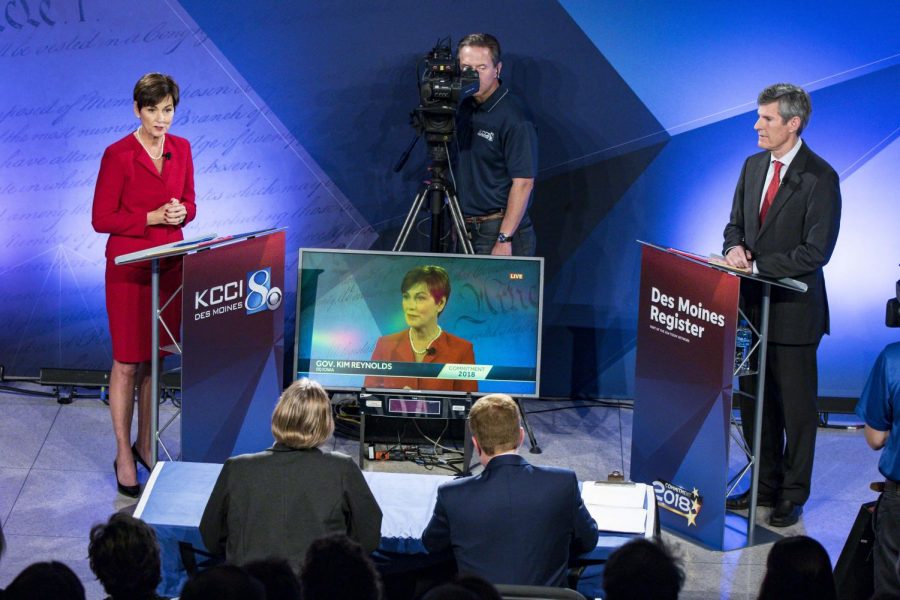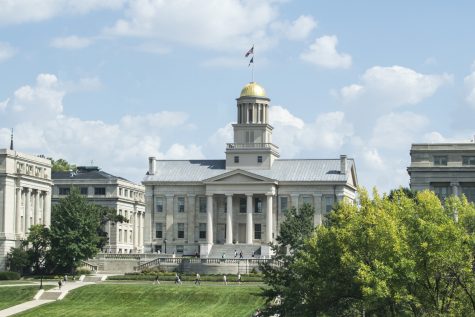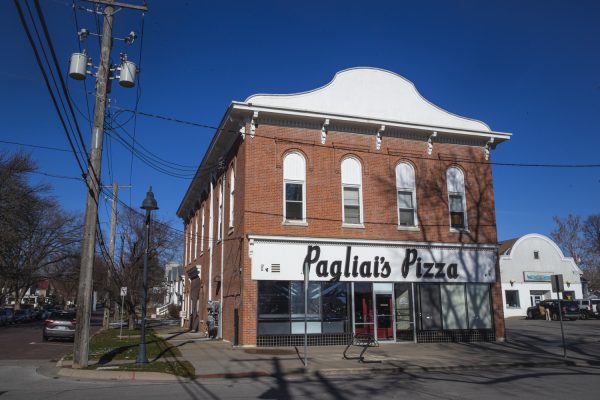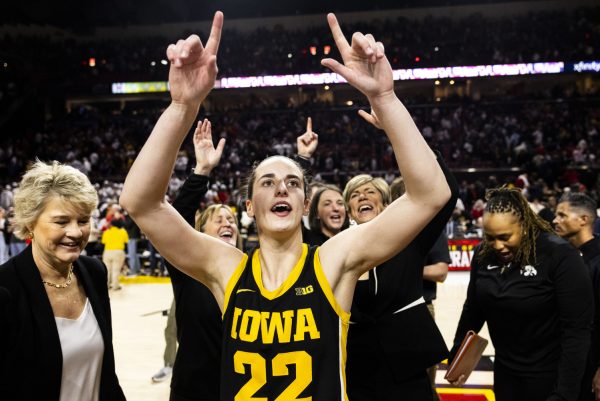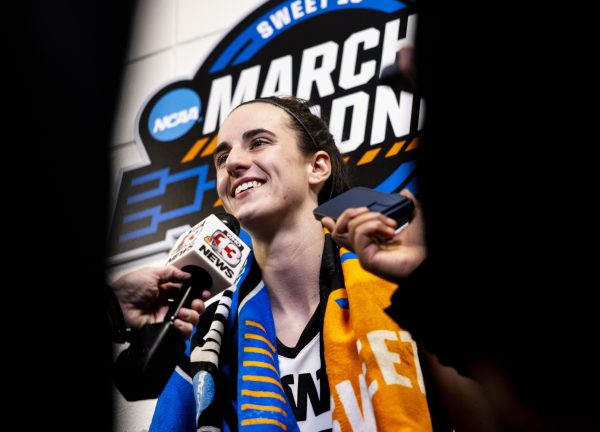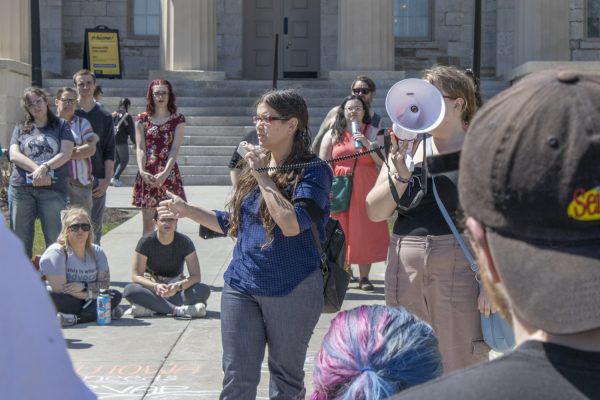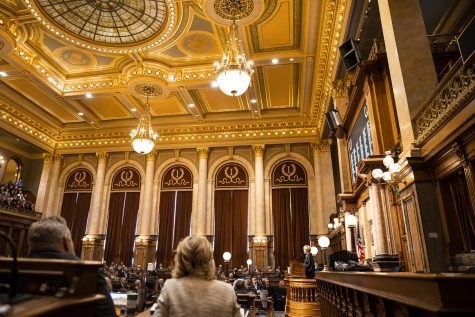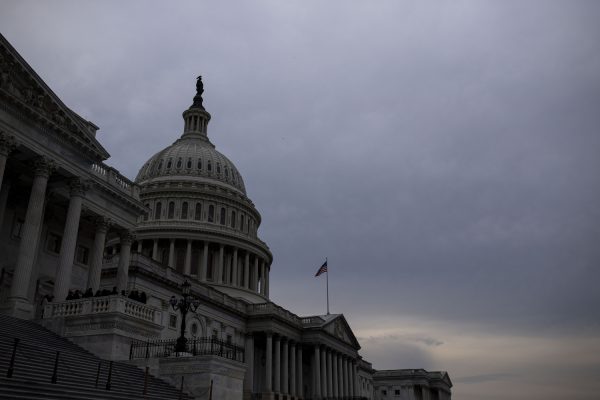Iowa gubernatorial candidates spar over state budget, Medicaid
In first of three debates, Gov. Kim Reynolds, a Republican, and Democratic challenger Fred Hubbell faced off at Des Moines Area Community College.
Republican Gov. Kim Reynolds and Democratic contender Fred Hubbell debate at Des Moines Area Community College on Oct. 10, 2018.
October 10, 2018
ANKENY — The two candidates for Iowa’s chief executive office sparred over topics of the state’s economy and Medicaid.
In a debate that grew heated at times, current Gov. Kim Reynolds, who succeeded former Gov. Terry Branstad in 2017, called the state budget balanced and revenue full. Her Democratic challenger, Des Moines businessman Fred Hubbell, said the budget was “out of control.”
The debate comes one day after President Trump visited Council Bluffs, where he rallied support for Reynolds and a slate of Iowa Republican candidates.
The debate was hosted by KCCI and the Des Moines Register on the Des Moines Area Community College Ankeny campus. Members of the Libertarian Party protested outside the auditorium to challenge that the Libertarian candidate, Jake Porter, was not included in the debate.
RELATED: Without media attention, Libertarians might lose status as official political party
Reynolds repeatedly stated that Iowa’s economy is the best it has been in a decade. She pointed to a report from the Iowa Legislative Services Agency released at the close of the fiscal year showed the state had a $127 million surplus, about $95 million more than was previously projected.
She said her administration has been cutting taxes in a fiscally responsible way, by monitoring trade and creating benchmark goals.
Hubbell said the surplus was due to $35 million in budget cuts to higher education and other services that the Legislature passed in 2018 after projected shortfalls in the budget.
“We can talk all day long about education being so important,” he said during the debate, adding that he would put more funding toward schools governed by the state Board of Regents.
“I’m afraid we are going to see massive budget cuts and more money out of health care, education, and infrastructure,” Hubbell said.
Reynolds fired back, asking how Hubbell would pay for increased state infrastructure if elected.
“You’re promising everyone money, money, money, money. But you have no way of telling us how you’re going to balance the budget,” she said.
Hubbell replied that he would end tax incentives to corporations.
“The truth of the matter is I’ve been managing complex budgets for over 30 years, and I think we can balance the budget, and there’s plenty of money in the state budget.
Reynolds also touted low unemployment in the state as a measure of the growing economy. August unemployment reached 2.5 percent, which is about 1.4 percent lower than the U.S. average.
RELATED: Iowa’s unemployment rate drops to an 18-year-low, second lowest in the country
Hubbell argued that even though unemployment is low, wages are low and income is stagnant.
Conversations of Medicaid drew claps and cheers from supporters of both candidates in the crowd at the debate.
Reynolds defended the 2015 decision to transfer care to private managed-care organizations, saying her administration has now had two years of experience and is handling Managed Care Organizations.
Reynolds was lieutenant governor in 2016 when Branstad made the decision to move Iowa’s Medicaid programs to be handled by private businesses under state contracts.
Human Services announced in August that Medicaid costs to the state would increase 7.5 percent in new contracts with state’s two managed-care operations. This is an increase from the $1.34 billion for the program the state appropriated to the program for fiscal 2019.
Documents from Human Services released in September show Medicaid costs per enrollee went up 11 percent from fiscal 2018 to fiscal 2019, surpassing $10,000. Costs per person had dropped about 5 percent in the previous two years.
Hubbell called Reynolds’ handling of medicaid a crisis, saying the cost of Medicaid is rising faster than before it was privatized.
“We need to put the state in control of Medicaid,” he added.



